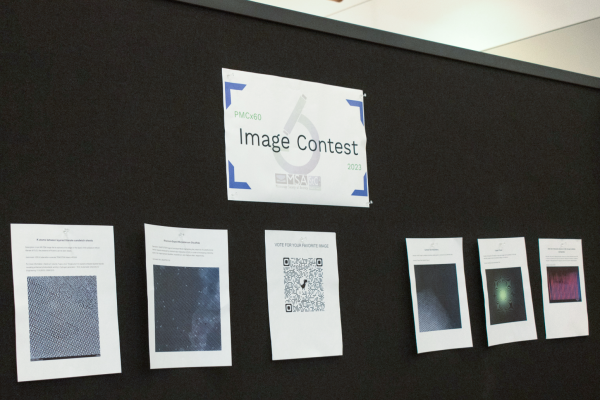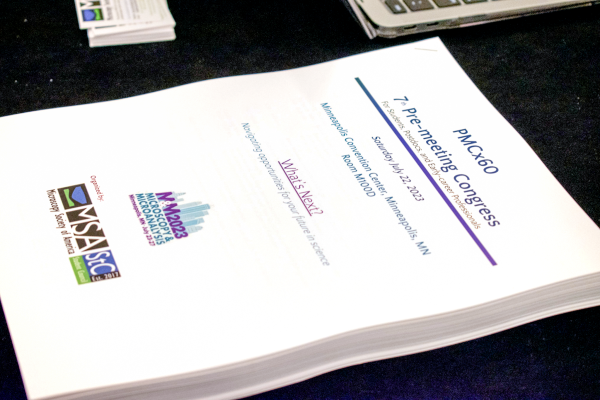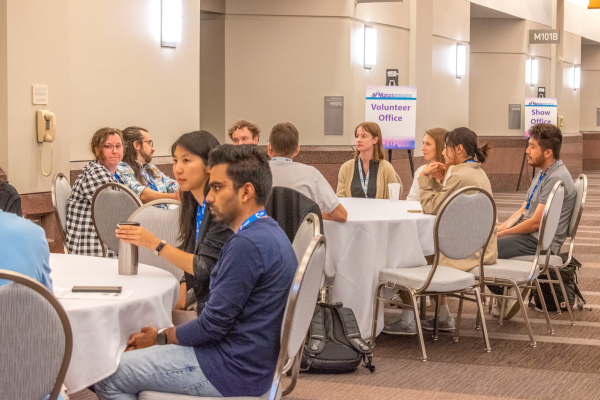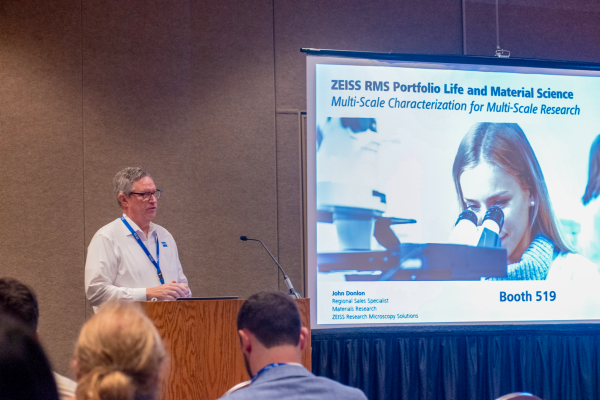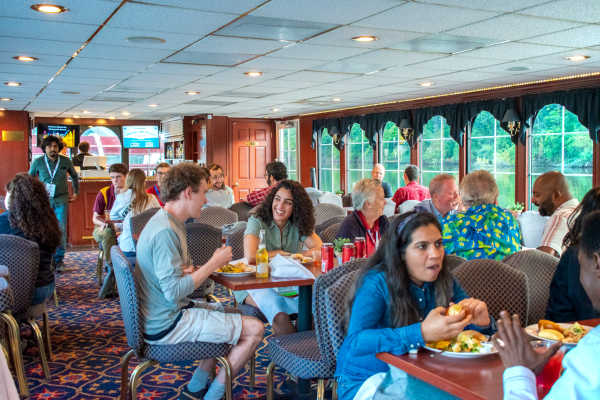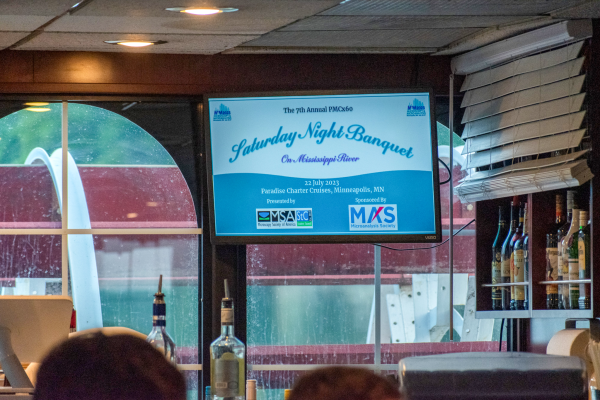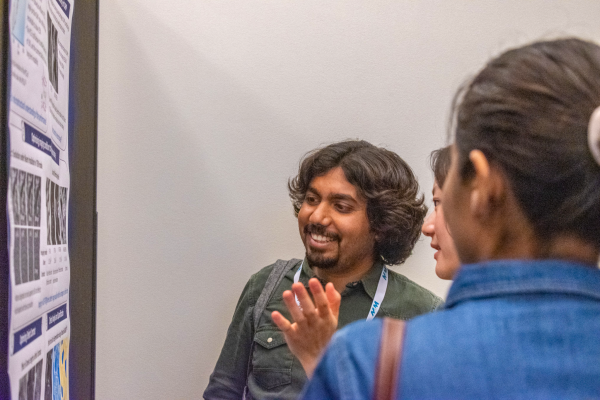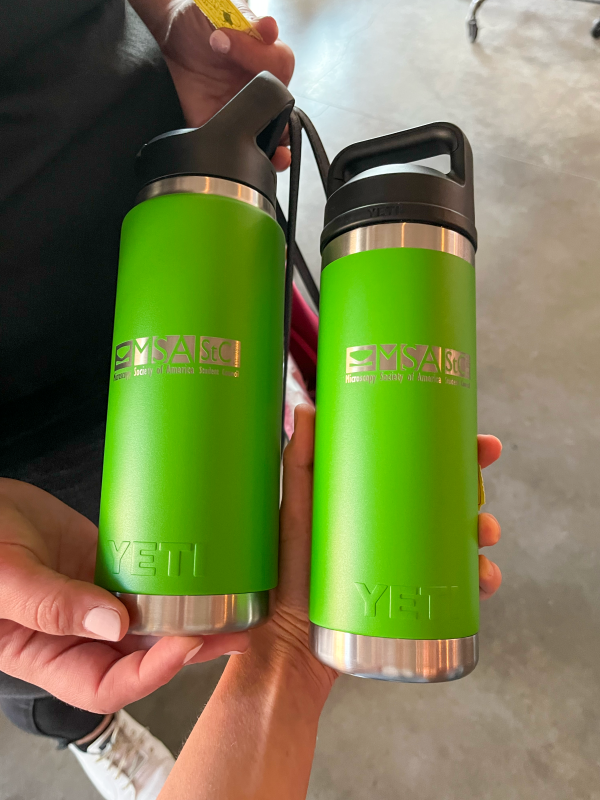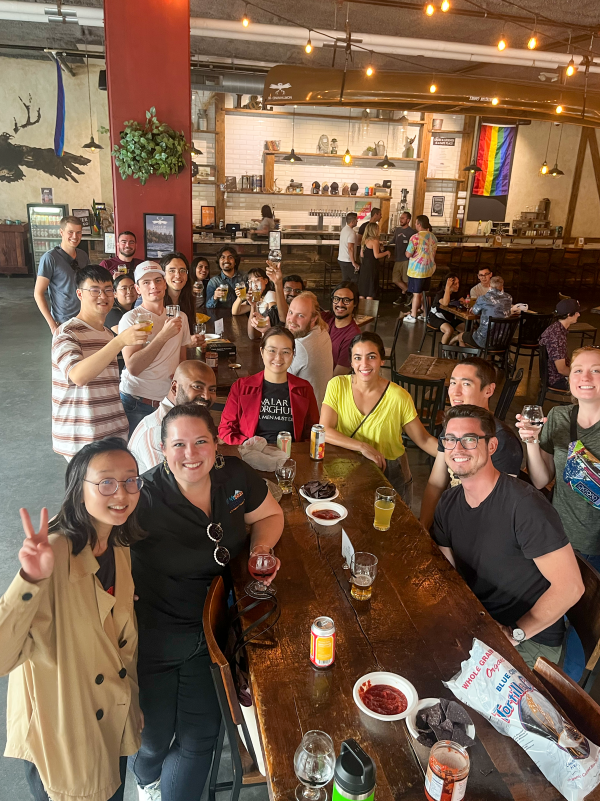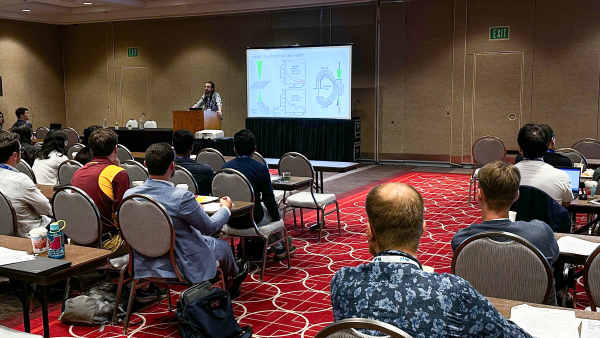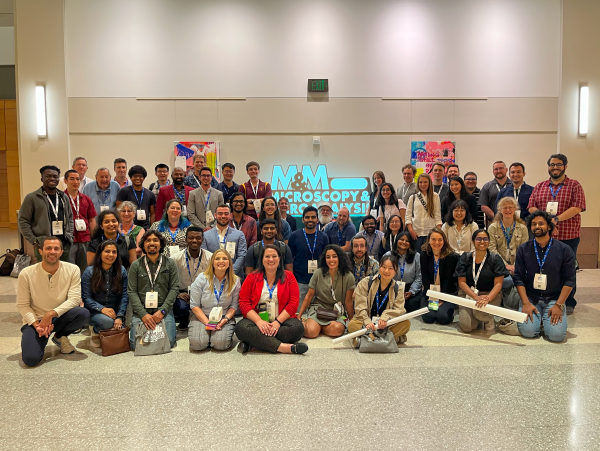jjj
Annual Pre-Meeting Congress for Students, Post-Docs, and Early-Career Professionals in Microscopy and Microanalysis
Separate registration required — Make sure to check the box when registering for M&M 2024!
INCLUDED IN REGISTRATION FEE: Breakfast, Lunch, Coffee and Refreshments, Evening Banquet
- PROGRAM CHAIR: Yifan Wang, Arizona State University
- BIOLOGICAL SCIENCES CO-CHAIR: Abayomi Adegboyega, Purdue University
- PHYSICAL SCIENCES CO-CHAIR: Huiming Guo, University of California, Irvine
- SOCIAL CHAIR: Daniel Zangeneh, University of Illinois - Chicago
- POST-DOC SUBCOMMITTEE CHAIR: Jake Garcia, Ph.D., National Institute of Standards and Technology
This pre-meeting congress is organized by and for students, postdocs, and early-career professionals, and provides:
- Technical workshops from leading industry experts
- A forum for students to deliver presentations to peers ahead of the meeting
- Career guidance from established researchers in academia, industry, and national labs
- Overview of career trajectories for postdocs, and tackling the transition between fields
- Mentoring and recruiting opportunities for early-career professionals
-
Opportunities to share your research in an engaging, constructive, and interactive setting
to practice ahead of the main meeting and win awards - Expanded professional networking and career development mentoring
PMC X60 Schedule of Events
| Friday, 26 July 2024 | |
| 6:00 - 8:00 PM |
Friday Night Social Reception Location TBA |
| Saturday, 27 July 2024 | |
| 8:00 - 9:00 am | Breakfast & Poster Check In |
| 9:00 - 9:15 am | Opening Remarks |
| 9:15 - 10:00 am |
M&M Award Winning Abstracts: Students & Postdocs |
| 10:00 - 10:45 am |
Poster Session & Break, refreshments provided |
| 10:45 - 12:00 pm |
Early Career Professional Talks - Aligning your Focus on Professional Possibilities |
| 12:00 - 1:00 pm | Lunch |
| 1:00 - 1:45 pm | Advantages of Society Membership for Career Advantages |
| 1:45 - 2:30 pm | Sponsorship Talks - Navigating the Many Pathways into Industry |
| 2:30 - 3:15 pm | Poster Session & Break, refreshments provided |
| 3:15 - 5:30 pm | Career Session with Group Photo to End |
| 6:30 - 9:30 pm | Saturday Night Banquet at Lakeside - The Event Space at Nuevo |
Career Workshop
Career workshop
Have a chat with the experts and peers! The career workshop is designed to give everyone a chance to learn from the experts and share what you think with peers about the confusion you have about your career. No matter which stage you are at, we believe you can learn something new! Join up to 4 half-hour roundtable discussions on following themes:
- Academic Interview
If you are interested in pursuing academic teaching and research careers, please come to our Academic Interview Panel. You will gain insights from professionals on crucial information and practical suggestions about the required skills including research and teaching, materials preparation such as CV, young investigator proposal, diversity statement and presentation, and the interview process.
- Industrial Interview
Are you ready to take your career to the next level? Join us for an engaging and informative discussion session on Industrial Interviews, where you'll gain valuable insights and practical skills to excel in your job search.
- All about proposals
If you’re curious about how to write successful grants or fellowship applications, consider attending this discussion section! We’ll also discuss how to tailor applications for use of facilities, equipment, and other lab spaces. This is an invaluable skill to provide your own funding and get hired by future companies, so don’t miss out!
- Settling in
Join our panel discussion to explore practical tips for adapting to new roles and environments. We'll discuss how to transition to a new field or project, build your career in a new country,
and relocate with a partner. This session is perfect for anyone looking to make a smooth transition and settle into their new surroundings with confidence.
- Communication Skills
Communication is important! Whether you like it or not, you will have to talk with your colleagues, boss, or collaborators about work and research. It is not a trivial task to have the information delivered without misunderstanding or confusion. An efficient communication can make everything much easier. Chat with our experts to find out what should be noticed during communication, and what skills can be used!
Invited Early Career Professionals
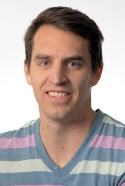
Spencer A. Reisbick, Brookhaven National Laboratory
Spencer A. Reisbick received his B.A. from Ripon College where he majored in chemistry and physics. Then, he obtained his Ph.D. under the guidance of David Flannigan at the University of Minnesota where he focused on laser-driven ultrafast electron microscopy (UEM). After graduation, he did his postdoc under the guidance of Yimei Zhu where he helped to develop laser-free UEM at Brookhaven National Lab. Recently, he has become a staff scientist and remains dedicated to enhancing and developing the performance, applications, and capabilities for new UEM advancements.
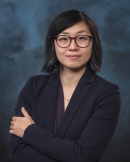
Dr. Steffi Woo, Oak Ridge National Laboratory
Dr. Steffi Woo is a R&D Associate in the Center for Nanophase Materials Sciences at Oak Ridge National Laboratory in Oak Ridge, TN. She has a B.Eng. in Materials Engineering and Society with a minor in Chemistry from McMaster University (Canada). She obtained her M.A.Sc. in Materials Engineering for her thesis work on the characterization of extended defects in group III-V semiconductor thin films by conventional transmission electron microscopy (TEM) also at McMaster University in the group of Prof. Gianluigi Botton. Her Ph.D. work focused on the structural and chemical variations in group III-nitride nanowire heterostructures at the nano- and atomic-scale, also supervised by Prof. Botton. She was previously a post-doctoral researcher in the STEM group at the Laboratoire de Physique des Solides in Orsay (France) with a focus on the optical response of 2D materials, including hexagonal boron nitride and transition metal dichalcogenides using electron energy-loss spectroscopy (EELS) and cathodoluminescence.

Alexis Williams, Oak Ridge National Laboratory
Alexis Williams received her BS degree in Biochemistry, Cellular, and Molecular Biology from the University of Tennessee. She spent two years in a post-baccalaureate research program at Oak Ridge National Lab learning protein crystallography and neutron scattering. She received a PhD in Biophysics and Structural Biology from the University of Texas Medical Branch where she was a McLaughlin Infectious Disease and Biodefense Graduate Research Fellow. During her PhD, she was interested in understanding how viruses utilize host factors to evade immune system detection in efforts to further vaccine design. She went on to be an NIH Endocrinology and Gastroenterology Postdoctoral Research Fellow at Vanderbilt University Medical Center. She was interested in understanding the effects of lipid sensing on the function of nuclear receptors and how molecular glues drive protein polymerization. Alexis is currently an Associate Research Scientist at Oak Ridge National Lab in the Center for Nanophase Materials Sciences. Her research interests are in designing abiotic interfaces to detect and combat pathogens, understanding how carrier physiochemical properties alter the delivery of cancer therapeutics, and engineering enzymes to aid in the degradation of plastic wastes. She also works with users interested in utilizing cryoEM to study proteins, cells, and soft matter through CNMS and SNS user programs and manages ORNL’s cryoEM sample preparation labs, the G4 Krios Cryo S/TEM, and workstations for data processing.

Martina Heller, Carl Zeiss Microscopy GmbH
Martina Heller is an Applications Development Engineer for Nanoscience and Nanomaterials at Carl Zeiss Microscopy GmbH, Germany. She received her Masters degree at the Friedrich-Alexander-Universität Erlangen-Nürnberg (FAU) in Material Science. After receiving her degree, she joined the institute of general material properties at FAU and worked as a research associate. The research focus of the PhD project was Hydrogen embrittlement in iron investigated by Atom Probe Tomography (APT). To facilitate this research a deep understanding of cryo-FIB/SEM preparation techniques and APT were needed. To keep the samples between a charging device, a FIB/SEM and APT system in an ambient environment and at cryogenic temperature, she worked on developing a cryo-transfer system for the investigation of Aluminum alloys and Hydrogen embrittlement in iron. A side focus of her work was to prepare atom probe samples with a Laser ablation device. The investigated materials ranged in collaboration projects from coatings to fuel cells.

Louisa Mezache, Aix-Marseille University
Louisa Mezache recently completed her PhD at The Ohio State University in Dr. Sai Veeraraghavan’s lab, where she studied the functional effects of structural remodeling of the cardiac intercalated disc. She was introduced to microscopy while working for a small start-up, but has gained a greater appreciation for it while working with Dr. Veeraraghavan. Prior to returning to school, She worked as a clinical research coordinator in neuromuscular diseases. There she helped patients with spinal muscular atrophy (SMA) access a novel multimillion-dollar drug treatment. She has been a member of the MSA Student Council (StC) since 2019 and has developed important leadership skills over the years as a continued member and has truly grown as a person. As Past President this year, she is excited to continue StC’s mission to help provide my fellow microscopists in training with the same access to resources that being a part of this MSA community has afforded her.
M&M Student & Post-doc Award Winning Speakers

Jingshan Du, Pacific Northwest National Laboratory
Jingshan S. Du is a Washington Research Foundation Postdoctoral Fellow at Pacific Northwest National Laboratory. His research spans crystal formation and transformation pathways, in situ electron microscopy, and complex atomic configurations in nanostructures. Du received a Ph.D. in Materials Science and Engineering from Northwestern University in 2021. He is an Associate Editor of Frontiers for Young Minds and a member of the Early Career Boards of Nanoscale Horizons and ACS Biomaterials Science & Engineering.

Birk Fritsch, Forschungszentrum Jülich
Birk Fritsch studied Nanoscience at the University of Kassel in Germany. During his studies, he was awarded a German excellence scholarship (“Deutschlandstipendium”). After obtaining bachelor (2016) and master of science degrees (2018) and a research internship at Fraunhofer Institute for Applied Optics and Precision Engineering, Birk joined Friedrich-Alexander-Universität Erlangen-Nürnberg (FAU) to pursue a PhD on beam effects in liquid phase transmission electron microscopy. During his studies, he was awarded a scholarship within the FAU research training group "In situ Microscopy with Electrons, X-rays and Scanning Probes", led by Erdmann Spiecker.
After obtaining his doctoral degree in 2023, he joined Karl Mayrhofer's electrocatalysis department at Forschungszentrum Jülich (FZJ). In Andreas Hutzler's team, Birk focuses on operando studies of degradation mechanisms in electrocatalysis, for which the FZJ Young Excellent Scientist Program recently awarded him.
He is the father of two young daughters, enjoys watching (European) football, and looks forward to a great conference.

Shake Karapetyan, Cornell University
Shake Karapetyan is a graduate student in Applied and Engineering Physics at Cornell University, working in the Muller lab. She completed her undergraduate studies at NYU Abu Dhabi, focusing on optical microscopy and spectroscopy techniques. She has since transitioned to shorter wavelengths and is currently specializing in advanced scanning transmission electron microscopy (S/TEM) techniques, particularly electron ptychography. Her work focuses on characterizing buried interfaces and defects in various materials by pushing the boundaries of this novel technique. In her talk, she will highlight her research on modern transistor devices, conducted in collaboration with TSMC, utilizing multislice electron ptychography to address questions previously beyond the reach of standard S/TEM techniques.

Ruth Parsons, Duke University
Ruth Parsons graduated in May 2020 with a bachelors in biochemistry from NC State university where she worked in a microbiology lab on Clostridioides difficile bacterial genetics. Following graduation she got her start in structural biology working at the National Institute of Environmental Health Sciences as a postbaccalaureate fellow where she contributed to the biochemical characterization of the protein treacle, a nucleolar protein implicated in the DNA damage response. In August 2021 Ruth started graduate school at Duke Biochemistry. Currently Ruth is a 3rd year PhD student in Priyamvada Acharya’s lab. Ruth’s thesis research focuses on using structural biology and biochemical techniques to study the SARS-CoV-2 spike protein and how it has evolved over time.

Nicholas Rienstra, University of Wisconsin - Madison
Nicholas Rienstra is a second-year undergraduate at the University of Wisconsin-Madison. Studying Engineering Mechanics with a specialization in Aerospace applications, he found a research position at the Wright Lab. With a desire to focus his future research on materials science and its engineering applications, the opportunity to work with electron microscopes is perfect. His research focuses on correlative electron and visual microscopy, and the creation of devices for this purpose. Receiving multiple undergraduate research fellowships, Nicholas’ research is a key factor in his undergraduate education.
Submit Today!
Apply for the PMCx60 Scholarship
The PMCx60 organizers are pleased to offer financial support to qualifying PMCx60 registrants. All PMCx60 registrants are welcome to apply. The awards will be granted primarily on the basis of financial need — those who are unable to attend the PMCx60 without financial aid will be prioritized.
There is a limited number of awards available that will cover costs associated with attending
PMCx60 up to $500 to be reimbursed after the meeting. Early Rate registration ends on May 9, so register now!
Click here to apply for PMCx60 Scholarship.
Submit a Poster for PMC X60
We are now accepting submissions to the poster session at PMCx60. This is a great opportunity to showcase your work and practice your presentation in a more informal setting ahead of the main meeting. We will also be offering a number of speaker prizes!
If you have any questions feel free to reach out to the PMCx60 chair, Yifan Wang, ywan1240@asu.edu.
Click here to submit a poster abstract.
Submit an Image for the StC Image Contest
Submit to the StC image contest! The winner's PMC registration fee will be waived, and their image will be used as the new background on next year's StC flyer advertisements.
Submission deadline is Friday, July 12th!
Click here to submit your great image!
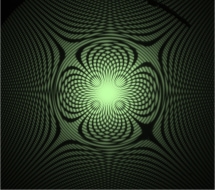
2023 Image Contest Winner
Makoto Schreiber, University of Alberta
Copper Flower
FAQS
Frequently Asked Questions
What is the purpose of this pre-meeting congress (PMC) X60?
The pre-meeting congress is organized by the Microscopy Society of America (MSA) Student
Council (StC) to provide students, postdocs, and early career professionals with an opportunity to engage in discussions, workshops, and networking sessions tailored to their needs and
interests. It aims to enhance their understanding of current trends, challenges, and opportunities in their respective fields and foster collaboration and knowledge exchange among
participants.
How do I register for the pre-meeting congress?
Registration is available on our website. While registering for the main conference, on the page
of “Optional Registration Add-Ons”, please select “X-60 Pre-Meeting Congress for Students,
Post-Docs, and Early-Career Prof - Student”. The registration fee for the PMCx60 is $95 for
students, and $191 for others.
What does the registration fee cover?
Registered participants will have access to sessions, workshops, and networking opportunities
throughout the day. Breakfast, lunch, coffee, and refreshments will be provided. Additionally, an evening banquet will offer further networking opportunities.
What is the Friday night social event? Do I need to register for PMCx60 to attend it?
The Friday social event is a casual event where everyone just grabs a drink (on our tap!) and
enjoys chatting with each other before the PMC and M&M! Everyone is welcome and you don’t have to register for the PMCx60 to join this event.
Are there any opportunities for financial assistance or scholarships?
Besides the travel award for PMCx60, students can also apply for the bursary program during
the whole conference. Detailed information will be provided through email closer to the
conference date.
Do I need to submit my poster to present at PMCx60?
You don’t have to! The only thing we need is your accepted abstract from M&M! Feel free to submit your abstract and get a chance to win the poster prize!
Who can I contact for further assistance or inquiries about the pre-meeting congress?
For further assistance or inquiries about the pre-meeting congress, please contact our
organizing committee at studentcouncil@microscopy.org.
Pictures from Last Year
